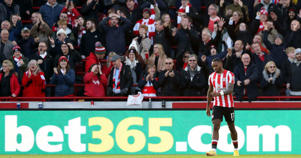The details of the Ivan Toney case have been made public, and they will only prompt further questions about the appropriateness of gambling ads in football.
Given what we now know about it all, the overwhelming feel that you take from the Ivan Toney story is one of sadness. Addiction is difficult to explain to anyone who’s never suffered from it. It’s not rational, as non-addicts would understand it. It can – some might say, almost certainly will – make you a worse person. It makes you act in ways that are self-defeating and outwardly selfish. And it can be extremely difficult to rein in once it starts to spiral out of control.
Indeed, considering that two of the eight months Toney will miss will be the summer break, it might even considered that he has come out of this somewhat lightly. The FA’s written reasons for the ban confirm he was initially due to be suspended for 11 months, but had this reduced by three because of his “genuine remorse” and a report by a psychiatrist confirming he is addicted and needs help, rather than further punishment.
Football’s formal tolerance of betting by those who work in it is formally zero, but the fact that there are players and even managers struggling with addiction has been an open secret for years. But if there is a spectrum of ways in which the game’s rules over it could be broken, Toney’s erred towards the more egregious end. Betting on his team – even if he only did so when he wasn’t available for selection – and his former clubs to lose is one of the more severe offences. Bets were put on at times when he would have been privy to information that wouldn’t have publicly available.
To be clear, there is no suggestion whatsoever that Toney has ever acted in a way that was detrimental – or sought to be as such – to any of the clubs he has played for.
But perhaps the time for forensically analysing every detail of this case is coming to an end. Maybe we should draw the lens back slightly. Ivan Toney will have known that his behaviour was against the rules. It’s difficult to imagine what the push and pull going on within the player himself might have been, between having won the lottery of life in being blessed with his ability at a time when those with it are lavishly rewarded, and having addiction threaten to sweep all of that away. How that can only have felt to the player concerned doesn’t really bear thinking about.

© Provided by Football365
Draw that lens back a little further, and the game itself starts to have questions to answer. For two of the three years that he has be playing for Brentford, Toney’s shirt has been advertising a gambling company. It was literally right there on his shirt. Pitch hoardings sporadically advertise them. Clubs, grounds and even entire leagues are sponsored by them. For those watching the television, almost as soon as the half-time whistle blows it’s off to a commercial break for the disembodied head of Ray Winstone to remind the watching audience that there’s no such thing as a bad time to have a bet. It’s everywhere.
The game is completely saturated with it, and it has long since passed a point of feeling that something that needs to be done to arrest it. Shirt sponsorship by betting companies is to be phased out by the end of the 2025/26 season, but will this be enough while Ray’s disembodied head exists, or we are shown bars full of attractive, healthy, young people with suspiciously clean-looking bar scarves, high-fiving and “cashing out” while the going’s good? Because that’s how people bet, not hunched over their phone screens on the train to work, trying to beat a system that everybody already knows is rigged against them.
Banning shirt sponsorship is a good first step, but does it go far enough? After all, where products are known to be legal but also known to cause harm, we tend to err towards allowing grown adults to make their own mistakes while banning the promotion of it. Smoking is the obvious example. but there is a clear complication. Football clubs and leagues haven’t been trying to make some sort of point by signing all these sponsorship deals. They agree them because they offer the most money. It’s just business.
The issue for the game should be clear, but completely banning the biggest sector currently advertising in football could have significant financial ramifications for clubs, and it may be something of a leap into the unknown. Tobacco advertising may be banned, but other than advertisement hoardings around grounds, this didn’t really impact upon football. Shirt sponsorship didn’t begin in England until the late 1970s, by which time it was clear that advertising tobacco products was something football clubs couldn’t get involved with. By the mid-1980s, one First Division team, West Bromwich Albion, were wearing an anti-smoking message as a shirt sponsor. Smoking cannot be done safely. Should there be a moratorium on gambling advertising until such a time that it has been established that the same can be said for gambling?
And it should also be added that Toney was a consenting adult over this, and that while we can have sympathy for his addiction, it should also be reaffirmed that, addiction or not, this is his responsibility to address.
This all could have been far worse for him. The FA, it has been reported, wanted a 15-month ban which was reduced. And as football continues to grapple with a decision that ultimately seems to be headed in one direction, we’re left with feeling of sadness, that this player’s name will now likely already be forever more readily associated with his weaknesses off the pitch than his exceptional ability on it.